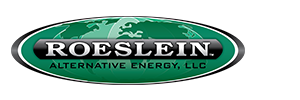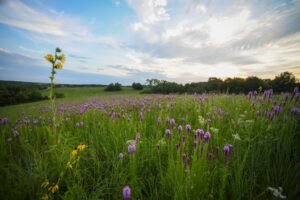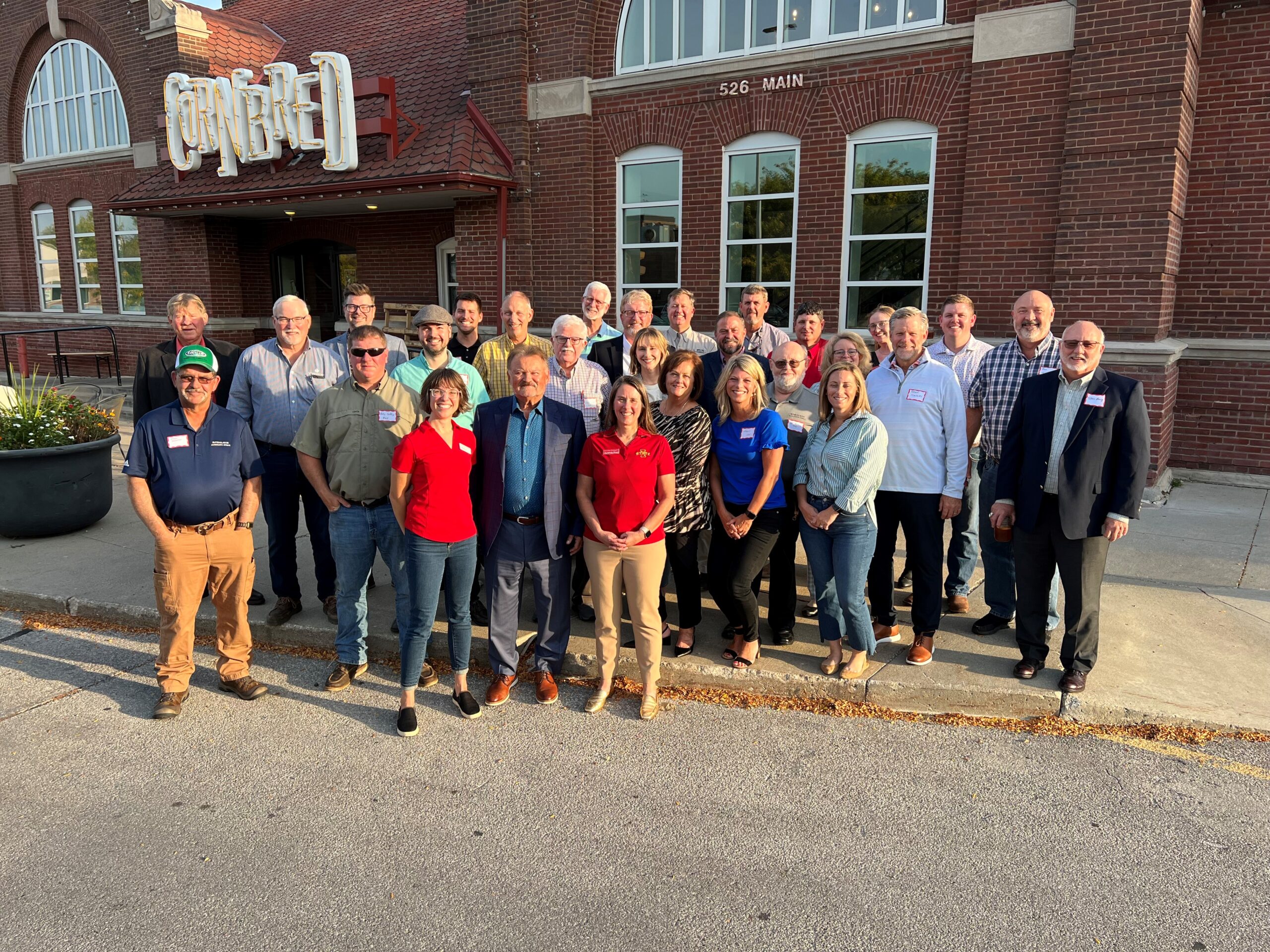Owners of Highly Erodible Land Will Receive $160 per Acre Cash Rent, Renewable Energy Revenue, Potential Environmental Credits
First 1,000 Acres of Native Prairie Now Being Planted Near Princeton, Missouri
St. Louis, MO (February 7, 2024) – The first 1,000 acres of the Horizon II pilot project are being converted to native prairie near Princeton, Missouri, showcasing a new way for landowners to earn income while improving the environment.
The project has funding available for another 39,000 acres of highly erodible land in Northern Missouri and Southern Iowa to compensate landowners. Horizon II seeks to build wildlife habitat, help the environment, and use sustainably harvested native prairie feedstock to create Renewable Natural Gas (RNG). There is also funding available to incentivize planting 40,000 acres of winter-hardy cereal rye cover crops which will also be harvested for RNG production.
Significant Financial Incentives Now Available Owners of Marginal Farmland
Through an $80 million USDA Partnerships for Climate-Smart Commodities grant awarded to a partnership of 13 public and private entities led by Roeslein Alternative Energy (RAE), Horizon II will provide owners of highly erodible land significant income to care for that property in a new, and arguably better, way. The incentives include:
- Rent: $160 per acre per year for highly erodible land for the duration of the contract.
- Turnkey Approach: Horizon II pays all expenses for prairie seed, installation, maintenance for first two years.
- Renewable Energy Revenue: Beginning in year 3, receive $37 per ton of harvested prairie biomass delivered to the RAE anaerobic digester that will be located near Albany, Missouri.
- Or: The landowner receives $1 per ton if RAE handles harvest and delivery.
- Potential Environmental Credit Compensation: Additional income from carbon sequestration and other ecological services (landowner receives 75%).
Planting Process – Emulating Mother Nature
Members of the media are invited to cover the first 1,000 acres of prairie being planted near Princeton, Missouri.
- Dormant Seeding (or Frost Seeding)
- Native Prairie seeds perform best when planted during the cold of winter.
- Seeds are broadcast over-ground beginning in late January.
- During frost-heaving cycles, the seeds work their way to the proper soil depth.
- After a couple of cold months in the ground, the seeds are ready for optimal germination in the spring.
- Locally Sourced Seed Mix: Diverse mix of forbs and grasses native to northern Missouri and southern Iowa, ensuring success in the region.
- Native Prairie seeds perform best when planted during the cold of winter.
Beyond Biogas: Ecological Services, Wildlife Habitat
While Horizon II produces renewable natural gas (RNG) from prairie biomass, the project also offers significant environmental benefits:
- Wildlife Habitat: Creates valuable habitat for native species.
- Ecological Services: Improves water infiltration, soil health, carbon sequestration, and prevents soil erosion.
Join the Horizon II Movement
Landowners, the future of sustainable agriculture is here. Join Horizon II and earn income while making a positive impact on the environment! The project will create a greener future for your land and your community! Join us!
- 39,000 acres still needed: Landowners in the Grand River Basin (northern MO, southern IA) are encouraged to participate.
- Focus area: Smithfield Foods Ruckman Farm near Albany, MO, will be the site of the next Horizon II RNG facility.
Information Session
March 1, 2024 (10:30 AM) with a catered lunch at noon. Please RSVP by contacting Steve Mowry, Director of Land Development and Prairie Establishment at [email protected] or by calling 816-830-6900.
Additional Contacts:
- Will Higgins, Development Manager, [email protected]
- Bryan Sievers, Director, Horizon II Partnership for Climate-Smart Commodities Grant Program, [email protected]
About Roeslein Alternative Energy, LLC
Roeslein Alternative Energy (RAE) is the owner, operator, and developer of renewable energy production facilities that convert agricultural and industrial wastes, along with renewable biomass feedstocks to renewable natural gas and sustainable co-products. RAE engages in these business operations with a focus on incorporating native prairie restoration. RAE recently merged with its parent company, Roeslein and Associates, in July 2023, with its principal offices located in St. Louis, Missouri. RAE was launched in 2012 by Rudi Roeslein, co-founder and chairman of St. Louis-based Roeslein and Associates, Inc. (a global leader in engineering, modular fabrication, and construction of industrial plant facilities). Visit our website https://roesleinalternativeenergy.com/ We also invite you to explore Prairie Prophets at https://prairieprophets.com/.
Frequently Asked Questions
- Q: Why is Horizon II called a turnkey project?
- A: Participating involves no cost to the landowner. They receive $160 an acre in rent, in addition to eventual funds for harvested biomass and potential environmental credits.
- Q: Is there any cost-share involved for participants in Horizon II?
- A: For anyone with highly erodible land who is also interested in grassland habitat, this is a wonderful program. In particular, they don’t have to put up any cost share money as with government programs.
- Q: What contractual agreements are involved for those participating in Horizon II?
- A: Landowners will sign a lease agreement, the length of which will be determined by the amount of time remaining in the grant period. For example, if a landowner agrees to begin participating with 4 years of the grant remaining, the lease will be for 4 years.
- There will also be a separate agreement with the contractor who will install and maintain the prairie so that the parties understand their responsibilities.
- Q: What happens after the grant period expires?
- A: We are committed to finding long-term funding and market solutions to sustain the project beyond the grant period.
- Q: Do I need to manage the prairie myself?
- A: After planting, RAE will remain responsible during the first two growing seasons for mowing, which is necessary to protect the new seedlings. Beginning in year three, harvest of biomass will occur. After year three, an agreed upon prescribed burn plan will be discussed with the landowner.
- Q: Can I still farm other crops on the land?
- A: Yes, you can continue to farm other crops on the land not enrolled in the program.
- Q: How can I learn more about the project?
- A: Visit our website, attend the March 1st information session, or contact us directly using the information above.



